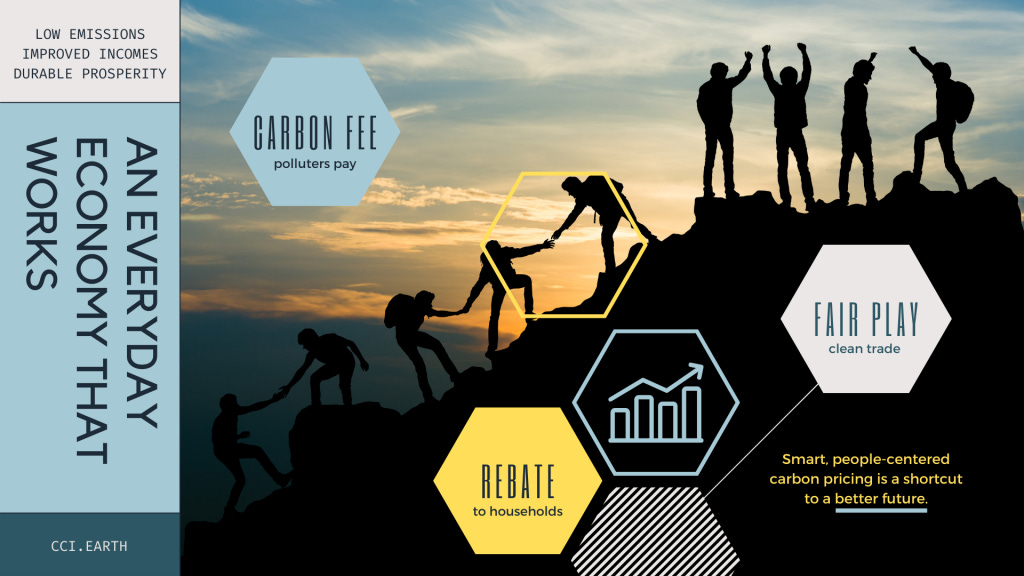Cooperative innovation in energy, food, finance & trade can halt climate breakdown
Briefing note from Citizens' Climate International and the Climate Value Exchange to the Spring Meetings of the World Bank Group and International Monetary Fund.
Ahead of the Spring Meetings of the World Bank and International Monetary Fund, CCI is calling for a significant increase in multilateral climate cooperation, in line with Article 6.8 of the Paris Agreement.
32 years have passed since the community of nations formally agreed to “prevent dangerous anthropogenic interference with the climate system”. Since the Paris Agreement 8 years ago, many nations have committed to reduce net carbon emissions to zero, in line with global heating of no more than 1.5ºC, and yet global heating emissions are still rising. As impacts have spread, accumulated, and compounded each other’s effects, it has become clear that we need to build an economy founded on real-world climate value.
It is projected at least $178 trillion will be lost by 2070, if we do nothing. The Food System Economics Commission has found that hidden costs of unsustainable food systems alone have already cost $122.85 trillion—just since the Paris Agreement was signed in 2016. US financial regulators have sounded the alarm—under both climate-skeptic and climate-activist presidents—that unchecked climate change could collapse the entire financial sector and undermine its ability to sustain the wider economy.
The bottom line is: We cannot afford not to activate the tools we have to drive rapid, cooperative transformation, and help to secure a future of sustainable shared prosperity.
Multilateral cooperation
One of the most important such tools is non-market multilateral climate cooperation, as outlined in Article 6.8 of the Paris Agreement. “Non-market” just means everything that does not include emissions trading. In other words: this one brief segment of the Paris Agreement invites nations to cooperate across all of their dealings. The 196 nations that signed up to the Paris Agreement that have already agreed that climate can be part of every multilateral engagement.
Emissions reduction and energy innovation and investment can all benefit from this kind of cooperation. The hidden costs of climate pollution are piling up fast; this market failure—to properly set the price of polluting energy—can be reversed through carbon pricing policies; Article 6.8 supports cooperation around pricing levels and related energy standards and investments, so long as those arrangements don’t include emissions trading.
Climate income is one way to do this. The key is that revenues go back to households, so polluting businesses can’t easily pass their business costs to consumers. Climate income can help local economies grow, even as national economies and trading relationships see pricing pressure to decarbonize rapidly.
The PARIS Principles can help to distill multilateral discussions around aligning pricing models, so cooperative outcomes are more likely, more effective, and more investable:
Price pollution with a defined, steadily rising price on climate-disrupting emissions, preferably at the source.
Add momentum. Enhance incomes; build economic value at the human scale.
Reduce emissions effectively and accountably, by keeping the administrative structure simple and transparent.
Internalize inefficiencies—cost and harm linked to polluting business models—incrementally, with escalating certainty and with no leakage.
Spread by aligning price signals and supporting policies, harmonizing across borders, so pricing can be enacted country by country.
What we should see, if the PARIS Principles are implemented to enable widespread multilateral cooperation, is real progress toward climate-aligned trade and sustainable development.
Food systems finance
A vital part of the climate transformation must also be the transformation of food systems. The current model is not sustainable. The simultaneous failure of multiple major food growing regions to produce sufficient exports is growing more likely. Hunger is spreading, and farmer livelihoods are not only under pressure; they are facing existential threats.
Food systems finance needs to evolve, so the whole economy does better investing in sustainable practices, meaningful rewards for producers that produce uncontaminated food, while restoring and sustaining ecosystems and carbon sinks. A shift toward good food finance as the mainstream standard can make food systems into an anchor of the climate value economy.
To develop an everyday economy organized around climate value—which may eventually be the only form of prosperity possible—we need to bridge the divide between large pools of capital and small-scale actors. We need finance to find new ways to create value in communities that are usually not on the finance radar. This will require new cooperative mechanisms for aggregating co-benefits and disaggregating capital flows.
The Good Food Finance Facility, now in development, will be designed to play this role. A critical piece of the new cooperative financial mechanism will be the integration of data systems to show where additional non-financial value attaches to increased return on investment. This will allow for reliable delivery of multidimensional metrics, like Climate Value, Resilience Value, or Good Food ROI—one kind of external return on investment.
Climate value for all
As more places deliver this kind of value, along with measurable insights about performance, new, diversified investments will support the creation of more and more climate value jobs. Any job can produce climate value, and governments, investors, banks, and insurers will see the core financial value of investing in those better quality products and services.

Intergovernmental negotiations—especially those around the reform of the international financial architecture—should take a serious look at how:
climate income can facilitate effective, efficient carbon pricing and emissions reductions, while spurring improved local economic activity;
food systems finance and related data systems and metrics can deliver new investment and more decent work to communities across the value chain;
non-financial returns on investment build foundational value, supporting improved financial returns, expanded job creation;
multilateral climate cooperation can turn trade relations into major breakthroughs in climate-aligned investment and development.
Cooperative innovation can halt climate breakdown—if we leverage the tools we have to transform energy, food, finance, and trade. More information and related briefing notes can be found at ClimateValue.net



